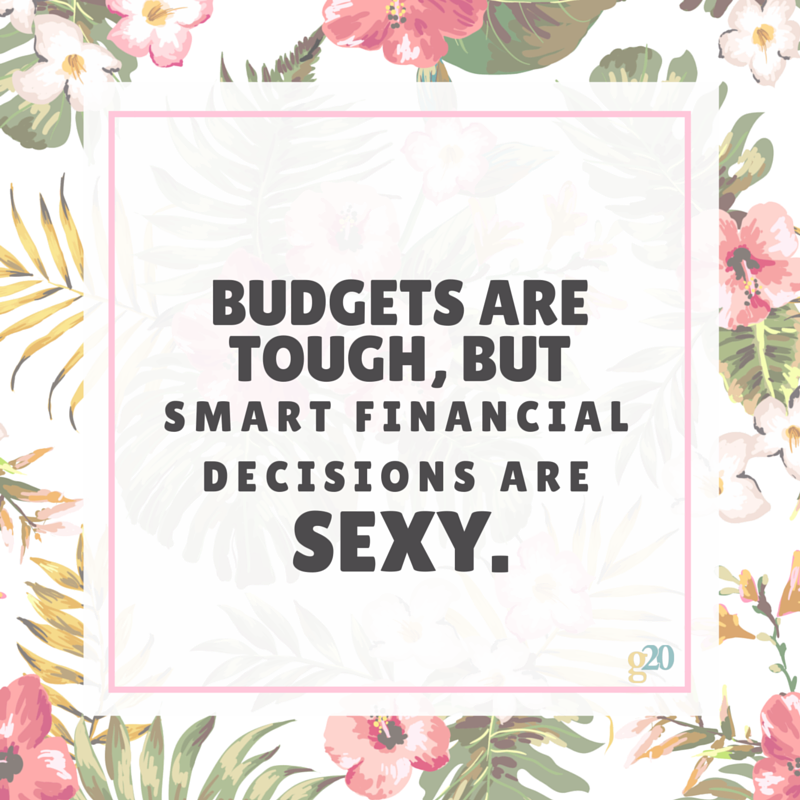
Take a minute to think about the kind of life you want.
Do you want to own a house one day, maybe have a family, go on fun vacations, travel to exotic locations or have a closet you adore? Or do you want to live paycheck to paycheck, constantly worried about what you will do if you have an emergency?
I don’t know about you, but I prefer the first option.
But in order to have that kind of life, it is essential that you spend time budgeting and managing your money now.
There’s a lot of people out there who say that you need a budget, but say nothing about how to make one that works with your spending habits.
Here are 7 tips for creating a budget that works with your spending habits:
1. The 50/20/30 Rule
This is a great place to start for creating your budget, especially if you think you have no control over your money.
According to this rule:
– 50% of your income goes to necessities (rent, food, transportation etc.)
– 20% goes to savings
– 30% to lifestyle (movies, entertainment, vacation, Starbucks, etc.)
This may not be something you have to maintain all the time (or even the perfect ratio for you), but it is definitely a good place to start for creating your budget.
Let’s look at an example:
Say you’re making $3,000 per month. According to this rule, no more that $1500 should be going to pay your rent, utilities, groceries, insurance, phone bill, internet, car payment, insurance, etc. The next 20%, or in this case $600, should be going to savings. That leaves you with $900 to use for lifestyle expenses.
This “rule” isn’t a hard one — you can adjust the percentages to meet your current financial situation. Maybe you want to decrease necessities and up spending. Go for it! It’s your spending, and it’s your budget.
2. Make sure you know how much money you bring in.
This may seem basic, but in order to make an effective and realistic budget, you need to know how much money you bring in after taxes.
If you are part time or freelancing, use the average of what you normally bring home. Low-ball it if you’re unsure.
3. Know what you are spending your money on.
For a few weeks to a month write down every expense you have. This may seem cumbersome, but it will help you to make sure your budget is truly reflective of what you spend.
Creating a budget that works with your spending habits means you need to know what your spending habits are. Don’t worry about “judging” your spending — just get to know it so that you can effectively manage your spending.
Make sure you are spending less than you are bringing in. This is the only way you can make sure you are staying out of debt.
How to live below your means: Living below your means is essentially spending less than you can “afford” to in all areas of your budget. It means that just because the leasing company will let you rent that $1200/month apartment on your $3k/month salary doesn’t mean it’s a good idea. You’d be better off pretending that you are only bringing home $2500/month and living off of that.
That way you can save the other $500 without missing it at all. Make sense?

4. Save and invest in your retirement.
Save, save, save. This is so important. It may seem like something you don’t want to do, but it will absolutely help you in the long run. If you’re interested in why saving for retirement in your 20s is so important, here’s why.
And please, please, please have an emergency fund. I recommend saving a little bit every month and only using it for legitimate expenses.
This will help you when something comes up that you didn’t plan for (which will happen more often than you would like, trust me). P.S. Here’s our guide on creating an emergency fund for yourself.
5. Use credit cards wisely.
Credit cards can be a wonderful asset. They help establish credit and many of them have great rewards. But credit cards can have a very dark side if you aren’t able to control your spending habits.
Learn this now, use your credit cards wisely! Only make purchases on them that you can afford. It is so easy to get into credit card debt for things you honestly don’t need.
Remember: Credit cards are not free money, but they are not a bad thing. There are many misconceptions about credit cards which we rectified for you here.
6. Write your budget down and check in constantly.
You can’t hold yourself accountable to your budget if you don’t keep track of it! Whether you use an app or excel (which is what I do), make sure you keep track of it and update it as you spend money.
You don’t need to scrutinize every transaction and be hard on yourself over spending money. But we do encourage you to be intentional and be in control.
Set aside time at least once a week to go over your budget and spending for the week. This will keep you on track weekly and monthly with your spending goals.
7. Don’t let your spending get out of control.
It can be difficult to tell ourselves no and to make strategic financial decisions, but if you want to stay out of debt, you may have to do that. You may have to turn down a trip or a shopping spree to make sure you are saving money.
Short term, it isn’t exciting, but long term you will be happy you saved that money.
[Tweet “How to Create a Budget That Works With Your Spending Habits”]
Your 5 Year Financial Plan
Once you feel confident about your budget and money habits, create a 5 year plan. Write down how much money you want to have saved and what big things you will need to buy within the next 5 years (maybe a car or a house).
This will help you to make sure you are on track to achieve that life you want. Think of it as a roadmap. If you don’t know where you are going, you won’t know how to get there.
Budgeting is tough, but smart financial decisions are sexy. Think about the kind of life you want long term and remember that every financial decision you make in your 20s has the ability to make that happen.
P.S. We made a monthly budget printable for you to help get you started creating a budget that works with your spending habits. Click the image below to get yours:

